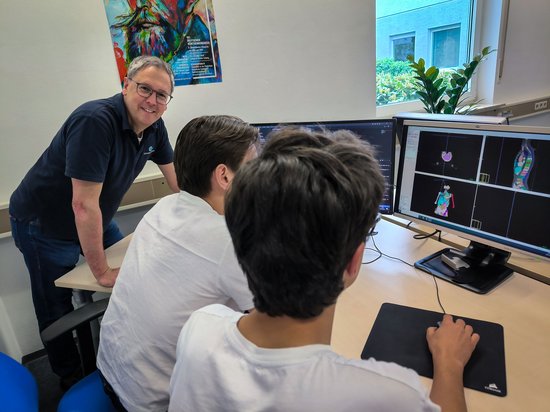Student internship at Chimaera: from the classroom to the AI workflow
This year, two ninth grade students from Geschwister-Scholl Gymnasium in Röthenbach a.d. Pegnitz once again had the opportunity to experience exciting tasks in medical technology as part of an internship.
From the very first day, it was clear that this internship was not about passive listening, but rather, hands-on learning. Under the guidance of our CEO, Marcus Prümmer, the students used AI to transfer organs and anatomical structures from real CT and MR images into digital CAD models ‒ a task that occurs in the everyday work of radiologists and medical technology engineers.

Programming with ‒ and despite ‒ AI
A highlight of the week: developing their own AI program in Python. Supported by modern AI tools, the students learned, among other things, how to extract mathematical functions from data and how to install, train and use a local large language model ‒ on their own computer, without using the cloud.
“Precisely because AI can automate so much today, it is all the more important to understand the underlying principles,” says their supervisor Marcus Prümmer. This is why he wanted the students to understand how the tools work, not just use them.
Between fractals and questions about the future
In addition to practical programming, creative discovery was also on the timetable: fractal graphics with recursive algorithms, an excursion into the world of generative AI for music and images ‒ and repeated discussions about the transformation of technical professions.
The focus was also on larger questions:
How is artificial intelligence changing medical diagnostics?
Will there still be traditional software developers in the future ‒ or will generative models take over?
And what do young people need to learn today to be able to work successfully in a world shaped by AI tomorrow?
More than just an initial glimpse!
At Chimaera, we don't view the student internship as a chore; rather, we see it as an investment in the future. “Our industry is changing rapidly ‒ those who can't keep up will be left behind. That's why it's important to us to spark young people's interest in these topics early on and provide them with the necessary tools.”
They seem to have succeeded. After just five days, the two students presented impressive results and left the internship with more than just an impression of everyday working life.
We hope they took away a lot of inspiration from this week, and we wish them all the best in their future careers!
